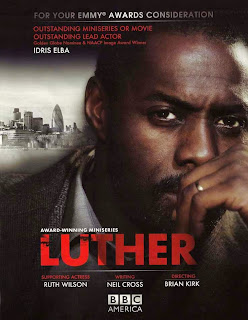The exam will ask you to discuss Texts. (Genre, Narrative and Representation)
You should approach this with consideration given to the TV Industry texts we have looked at; Luther, LoM and Common.
You will need to show good knowledge of the narrative devices used in TV crime drama with specific references to the shows we have looked at.
You should approach this with consideration given to the TV Industry texts we have looked at; Luther, LoM and Common.
You will need to show good knowledge of the narrative devices used in TV crime drama with specific references to the shows we have looked at.
_________________________________________________________________
TV Industry - Narrative
Crime has always been a popular TV drama narrative because:
- The good vs evil binary opposition is easily recognisable and dramatic.
- We like to try to solve the crime along with the detective, enigmas keep us hooked.
- The disruption (crime) and restoration of equilibrium (capture and punishment) offers reassurance that the police keep our society safe and that the government will protect us.
- Dominant (hegemonic) ideologies are upheld - crime and lawlessness do not pay, the law prevails.
- These are audience pleasures provided by this format.
Task 1:
Consider the question below
How do the narrative devices in your chosen texts offer audience pleasures?
Write bullet points based on the TV crime dramas we have looked at (Common, Luther and Life on Mars) with regards to narrative devices.
____________________________________________________________________
TV Industry - Genre
How do the chosen texts use genre conventions?
You should open your response by outlining what is to be understood by the genre conventions of TV Crime drama.
Give consideration to the following:
Settings, usually well known places or cities which are dangerous places.
Titles, can give a clue to the genre, CSI, Sherlock, Sweeney.
Mise-en-scene can include genre conventions, blood, X-Rays, weapons, fingerprints, police tape, sirens or cars...(discuss the Luther titles here).
Characters are divided into types; crime solvers, criminals, victims.
Propp's characters can usually be applied here. Say how the different types can be identified, white coats, stethescopes, rubber gloves for forenzic experts. Say that these stereotypes are expected.
That they are cliches used to get a message across quickly.
Lead characters will often have a back story, and will weave their personal life in to the narrative. There is usually mystery involved, or some sort of puzzle, so that the audience can try to figure it out themselves.
Almost always ends on a cliffhanger to keep the audience watching the next episode.
Binary opposites are often used to keep the audience interested.
Don't forget audio codes such as sirens and often a humming sound to make the audience uncomfortable.
Binary opposites are often used to keep the audience interested.
Don't forget audio codes such as sirens and often a humming sound to make the audience uncomfortable.
Consider the ideological implications of conforming or challenging the standard conventions of TV crime drama.
Be specific about the episode we looked at: LoM - Genre | Luther - Genre | Common - Genre
Task 2:
Write bullet points based on the TV crime dramas we have looked at (Common, Luther and Life on Mars) with regards to genre conventions.
Consider if the shows conform or challenge the conventions of the genre.
_____________________________________________________________________
TV Industry - Representation
Understanding the concept of representation is essential at A2 level.
You must be able to go beyond a simplistic discussion of stereotypes or positive and negative representations.
To analyse the impact of representation in media texts you must be aware of the context and the purpose of representation within the text. There are some key questions you must be able to consider:
- How has the world represented in this media text been constructed?
- What ideas and values are being communicated in the text? In this case by McGovern and the BBC.
- Who is the target audience of the text? How may different audiences respond to the representations contained within the text? Who will accept and who will challenge? (Consider Stuart hall here - Preferred, negotiated and oppositional readers).
- What messages are contained within the text? How might these messages impact upon the audience? How might Common, for example, impact upon a teenage viewer?
Crime and the police
Let the examiner know that you are aware of how characters are usually represented in TV crime drama.
Some dominant ideologies about the police:- Good
- Authoritative
- Powerful
- Male
- Moral
- Upholders of the law
Equally, dominant ideologies about crime and criminals are:
- Bad
- Marginalised groups (the unemployed)
- Must be punished
- Social decay
However, gradual changes in society, coupled with certain events (Hillsborough) have led to a gradual erosion of respect for authority and different perceptions of the police have emerged...
- Incompetent
- Corrupt
- Racist
- Female
Task 3:
Consider how representation of age and gender are constructed through visual and technical codes.
Do the texts we have looked at show positive or negative representations and show an awareness of the context and the purpose of representation within the text.



No comments:
Post a Comment